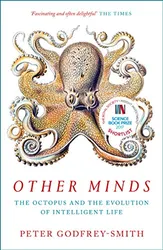When we think about the most intelligent animals on planet Earth, we usually, perhaps arrogantly, think first of all about humans, and the other great apes: chimpanzees, gorillas and orangutans. We might think of dolphins and other marine mammals. We may also think of birds, such as crows.
This book asks us to also consider the cephalopods, such as octopuses and cuttlefish, as highly intelligent creatures too. The author makes the case that there is a good reason to be interested in cephalopod intelligence, because it has evolved completely independently to our own intelligence and that of the other intelligent creatures. The closest common ancestor of a human and a cephalopod was some kind of worm, 600 million years ago, that didn’t have much intellligence at all. All the other intelligent species I’ve listed above (including the marine mammals) share a somewhat intelligent common ancestor and evolved their intelligence primarily on land. The cephalopods are unique in having developed intelligence independently, and in an underwater environment. When we study mammal and bird intelligence, we’re really studying the same kind of intelligence. What we learn from studying cephalopod intelligence is something much more alien. Perhaps it could even give us an insight into what extra-terrestrial alien intelligence might look like. Features that are common to both cephalopods and mammals may turn out to be present in any aliens we may one day encounter.
This book is a discussion of the evolution of intelligence in cephalopods in comparison to mammals, particularly great apes such as ourselves. It covers the author’s experiences diving with both octopuses and cuttlefish, including at a site known as Octopolis where many octopuses gather and display some unusual social behaviours.
The social behaviour seen at Octopolis is unusual largely because octopuses are mostly solitary animals. This solitariness presents some interesting questions about how their intelligence evolved. Many scientists think that social interaction has played a large role in the evolution of intelligence in other species. Keeping track of the social relationships between individuals in larger groups requires a lot of brain power. The book discusses this problem, as well as the possible significance of cephalopods’ ability to perform colour changes and display patterns on their skin, and the evolution of self-awareness as an extension of the ability to coordinate bodily movements which is present in much simpler organisms.
The discussion of skin colour displays in cuttlefish was particularly interesting. A change in skin pigmentation and pattern is used for camouflage, which makes sense for animals that both hunt and need to avoid predators. It can also be used to signal other cuttlefish, such as when aggresively defending territory or fighting for mates. But curiously, there seem to be cases where the skin cycles through different colours and patterns for no discernable purpose at all, when the patterns don’t match the environment for camouflage and there are no other cuttlefish around. The author speculates that this may be an unconscious reflection of the inner thought processes of the cuttlefish; a sort of visual representation of its mind wandering.
I learned a lot of new and interesting things about octopuses and cuttlefish, such as their surprisingly short lifespans for such intelligent creatures. I was fascinated by the idea that an octopus’s arms are somewhat independent from its brain, and have some level of intelligence of their own.
My expectations for this book were high, and despite being full of interesting facts and theories about cephalopod intelligence, I came away feeling slightly disappointed. It’s perhaps less scientific than I was expecting. The author is more of a philosopher than a scientist, and while the book contains science, it also depends quite a lot on the author’s experiences diving with Octopuses and Cuttlefish, and the opinions he’s formed through those experiences, rather than hard data. It is a really interesting and thought provoking read though, and I’m keen to read some other books by the same author, particularly his introduction to the philosophy of science.
